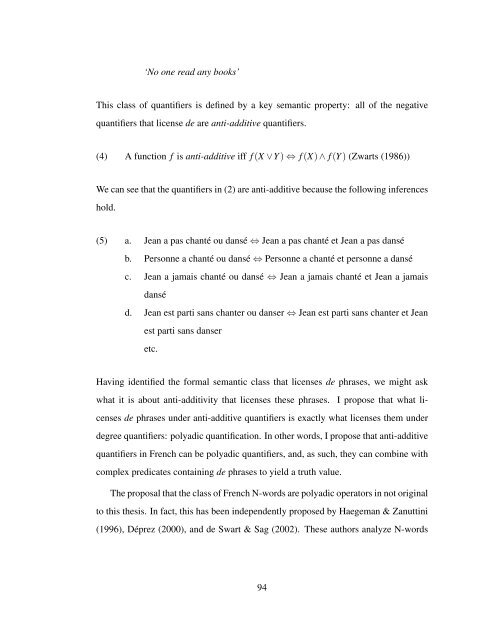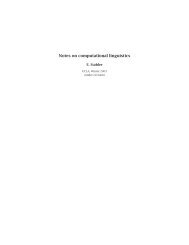Formal Approaches to Semantic Microvariation: Adverbial ...
Formal Approaches to Semantic Microvariation: Adverbial ...
Formal Approaches to Semantic Microvariation: Adverbial ...
Create successful ePaper yourself
Turn your PDF publications into a flip-book with our unique Google optimized e-Paper software.
‘No one read any books’<br />
This class of quantifiers is defined by a key semantic property: all of the negative<br />
quantifiers that license de are anti-additive quantifiers.<br />
(4) A function f is anti-additive iff f (X ∨Y ) ⇔ f (X) ∧ f (Y ) (Zwarts (1986))<br />
We can see that the quantifiers in (2) are anti-additive because the following inferences<br />
hold.<br />
(5) a. Jean a pas chanté ou dansé ⇔ Jean a pas chanté et Jean a pas dansé<br />
b. Personne a chanté ou dansé ⇔ Personne a chanté et personne a dansé<br />
c. Jean a jamais chanté ou dansé ⇔ Jean a jamais chanté et Jean a jamais<br />
dansé<br />
d. Jean est parti sans chanter ou danser ⇔ Jean est parti sans chanter et Jean<br />
est parti sans danser<br />
etc.<br />
Having identified the formal semantic class that licenses de phrases, we might ask<br />
what it is about anti-additivity that licenses these phrases. I propose that what licenses<br />
de phrases under anti-additive quantifiers is exactly what licenses them under<br />
degree quantifiers: polyadic quantification. In other words, I propose that anti-additive<br />
quantifiers in French can be polyadic quantifiers, and, as such, they can combine with<br />
complex predicates containing de phrases <strong>to</strong> yield a truth value.<br />
The proposal that the class of French N-words are polyadic opera<strong>to</strong>rs in not original<br />
<strong>to</strong> this thesis. In fact, this has been independently proposed by Haegeman & Zanuttini<br />
(1996), Déprez (2000), and de Swart & Sag (2002). These authors analyze N-words<br />
94
















